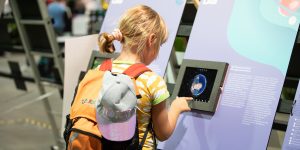While it is true that digital technologies have merely accelerated processes already unfolding across the industrialized world, they have changed our world and our lives radically over the last four decades. From the outset, Ars Electronica has viewed this as a societal rather than a technological development, and Ars Electronica’s European Platform for Digital Humanism has focused not on technologies but on their impacts.
Taking up these developments, the European Platform for Digital Humanism wants to show new pathways to a digital society and invites audiences to imagine a new future: it is time for us to resign our roles as mere consumers and data-generating machines. We must take responsibility for our futures.
Can, or should there be, something like a European way into the digital society, between the “data capitalism” of IT monopolists and the “data totalitarianism” of authoritarian regimes? If so, would a European “data humanism” also be competitive? Could applications of digital technology aimed towards human needs and established social conventions, which respect the autonomy of users over their data, be precisely this competitive advantage? Or, in other words: Is it possible to create a digital society that fosters competition and generates value while also reflecting European values?
A good argument can be made to the effect that the success of many digital products and services will shortly no longer depend on whether the processor is a little faster or the screen more colorful, but rather on the confidence the users have in services and on the credibility of the providers. To the extent that digital data will actually be the “new oil,” the raw material of the future; the “refinement” of this raw material will soon play a greater role than the material itself. Besides profitability, this also opens up opportunities for social appropriateness in dealing with our data seriously.
The cooperation of art and technology is much pined-for, and a large number of EU projects and cooperation initiatives have set themselves the goal of strengthening the role of art, creativity and education in the development of the ideas, concepts and scopes of action necessary for digital humanism. As a platform for art, technology and society, Ars Electronica currently coordinates and participates in several such cooperation projects funded by the European Union in the fields of culture, research and education.













